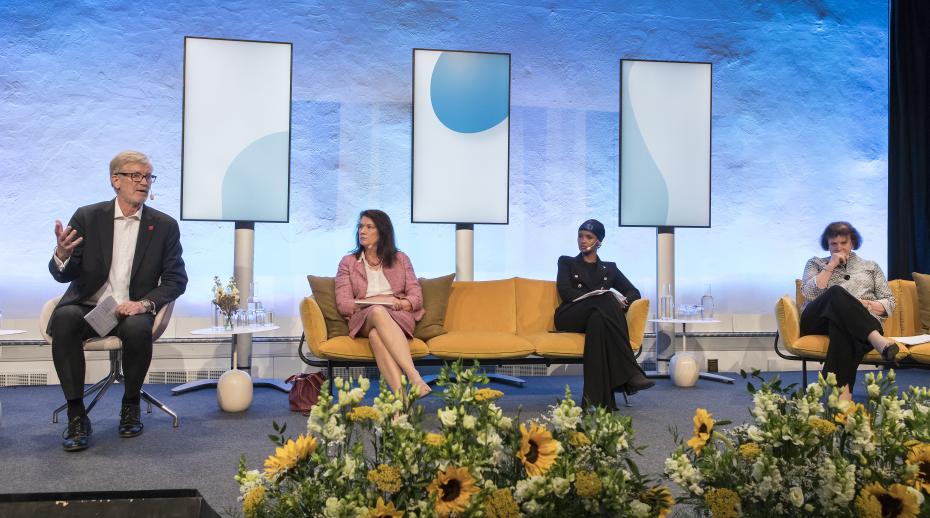
(Stockholm, 23 May 2022) Over the next three days, more than 2600 participants from 150 countries and over 70 partner organizations will convene in person and in a virtual space for the ninth annual Stockholm Forum on Peace and Development. Watch today’s opening session here and download the Stockholm Forum agenda here (PDF).
In a special Stockholm Forum session prior to the opening, SIPRI released the policy report Environment of Peace: Security in a New Era of Risk. Watch the launch event here.
The afternoon panel ‘Addressing the Climate Crisis and Protecting the Future of Democracy’ is available to watch on SIPRI’s YouTube channel.
This year’s Forum centres on the topic ‘From a Human Security Crisis Towards an Environment of Peace’ and was opened by Ambassador Jan Eliasson, former United Nations Deputy Secretary-General and Chair of the SIPRI Governing Board. Ambassador Eliasson’s address touched on the converging crises and a new era of existential risks in which no country can fight climate change alone. ‘We have to be ready to adapt. We have to ensure a just and simple transition from fossil-dependent to green societies. We have to make inclusion a rule,’ said Eliasson.
Nisreen Elsaim, President of the Sudan Youth for Climate Change and Chair of the UN Youth Advisory Group on Climate Change, gave the Keynote Address. Elsaim stressed that the Environment of Peace report takes a holistic approach to the problem we are facing today: the fear of the implications of the linkages between peace and security, and climate change. She commented that what is needed is ‘to go deeper to a microscopic level and to the community level to understand the complexity of what is happening and envision what a solution could look like’. Elsaim urged the audience to think of it as a global experiment that we cannot afford to fail at, and ‘doing our part is a very small step towards a solution’.
The theme for the first full panel was ‘Securing Peace in a New Era of Environmental Risk’ and was moderated by Dan Smith, SIPRI Director. Watch the panel discussion here.
Ann Linde, Minister for Foreign Affairs, Sweden, spoke of the urgency of the situation and highlighted steps that the Swedish Government has taken to promote climate and security. Sweden will appoint a new Ambassador for Climate and Security and revitalize the Climate Hub on Environment, Climate and Security. It is a ‘timely situation for these issues to be put forward’, added Linde, who noted the focus on climate and security in this year’s Forum leading up to next week’s Stockholm+50 conference.
Drawing from her experience working in Somalia, Ilwad Elman, Chief Operating Officer, Elman Peace, emphasized that ‘working on climate change is not a box that we tick after war, the same way as development is not a box that we tick after war. It’s part and parcel of the peacebuilding process.’ She highlighted one of the key recommendations of the report: ‘understanding and communicating the risks and building cooperation through education’.
Jessica Tuchman Mathews, Distinguished Fellow, Carnegie Endowment for International Peace, noted that ‘mankind still thinks about security in terms of weapons, guns and bombs. We have seen very little fundamental change in that.’ Addressing the audience, Mathews asked, ‘What will it take to grab policymakers?’
Dan Smith, Director, SIPRI, underlined that the two crises that are assailing us—environment and security—intersect in various different ways at both local level and global level. Smith concluded that many of the issues we are facing circle back. ‘We need not only think of long-term and short-term solutions but think across the various issues and see their connections.’
About SIPRI and the Stockholm Forum
The 2022 Stockholm Forum on Peace and Development enables interdisciplinary exchange among global thought leaders with the aim of influencing key policy and research agendas. It is co-hosted by SIPRI and the Swedish Ministry for Foreign Affairs.
SIPRI is an independent international institute dedicated to research into conflict, armaments, arms control and disarmament. Established in 1966, SIPRI provides data, analysis and recommendations, based on open sources.
The Ministry for Foreign Affairs is responsible for developing and implementing Sweden’s foreign policy. In addition to overseeing the operations of the country’s embassies and consulates, the Ministry for Foreign Affairs is responsible for Sweden’s development cooperation, trade and investment.
More Information
For media or photo requests, please contact Alexandra Manolache, SIPRI Media and Communications Officer, alexandra.manolache@sipri.org, +46 76 628 61 33.
Photos and videos from the event are available on SIPRI’s website. Follow @SIPRIorg on Twitter with #SthlmForum. Livestreams of panel discussions are available on SIPRI’s YouTube channel.
Stockholm International Peace Research Institute (SIPRI)
SIPRI is an independent international institute dedicated to research into conflict, armaments, arms control and disarmament. Established in 1966, SIPRI provides data, analysis and recommendations, based on open sources, to policymakers, researchers, media and the interested public.